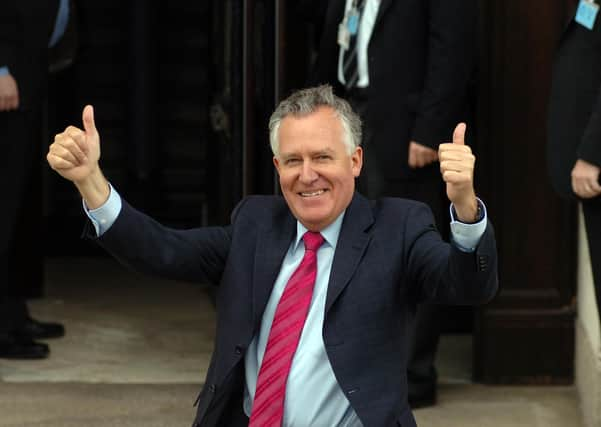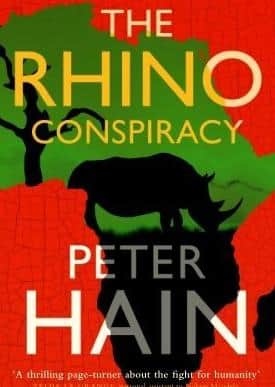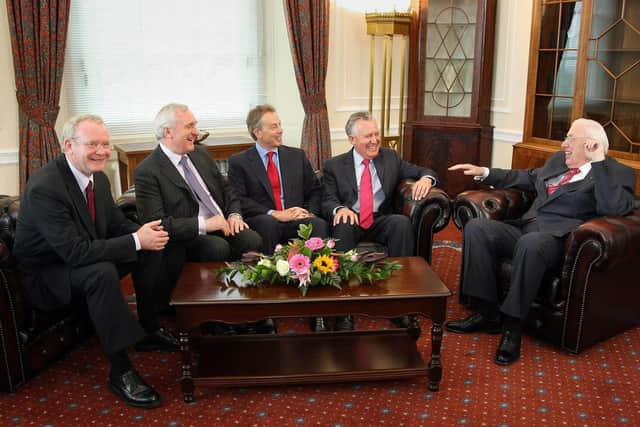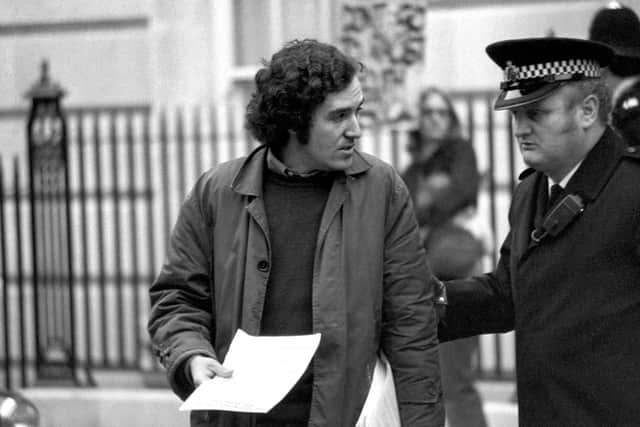Lord Hain discusses new thriller and lessons that need to be learned in NI


Former Northern Ireland Secretary of State Peter Hain has gone back to his roots to pen his first thriller.
Having been exiled from South Africa as a teenager, Mr Hain went on through British politics to become a Right Honourable Lord, though for the purposes of this interview he was happy for me to call him Peter.
Advertisement
Hide AdAdvertisement
Hide AdFor his first work of fiction Peter returns to South Africa, a country he was unable to visit between 1966 and 1994, to tell a story which marries wildlife and politics.


The Rhino Conspiracy centres on the poaching of the threatened titular species as well as looking at the anti-apartheid freedom struggles of the past and the corrupt politicians who are betraying the legacy of Nelson Mandela.
He said: “The idea came when I stepped down as an MP in 2015. Elizabeth (Haywood, Peter’s wife) and I went on a holiday of a lifetime, we went to three safari parks, two in Botswana and one in South Africa.
“It was the South African one called Thula Thula there that we got discussing the rhinos, the conversations with the rangers is where the seed was planted, that plus the horror at the betrayal of the Nelson Mandela vision by the corruption under President Zuma.”
Advertisement
Hide AdAdvertisement
Hide AdHaving come to the UK in 1966 when his parents were forced into exile for their anti-apartheid stance, Peter continued to campaign over issues in his place of birth.


He was a leading Anti-Apartheid and Anti-Nazi League Campaigner during the 1970s and 1980s.
As a Labour MP between 1991 and 2015 and a senior government minister for 12 years, he chaired the UN Security Council, negotiated international treaties curbing nuclear proliferation and helped forge the 2007 Northern Ireland peace settlement.
His books include his memoirs Outside In (2012), Mandela: His Essential Life (2018) and Pitch Battles: Protest, Prejudice and Play (2020).
Advertisement
Hide AdAdvertisement
Hide AdThe Rhino Conspiracy is his first work of fiction: “From my teenage years, I’ve learnt a bit about how you get pace and drama and build up to climaxes during the story so that you keep people gripped.


“I learnt that technique from reading thrillers for enjoyment and studying how the top thriller writers did it, the Gerald Seymours, the David Baldaccis, the James Pattersons.
“I thought of trying this format to both tell what I hope is a page-turning story but to raise other issues about the threat to extinction to rhinos and the way that ultimately political corruption and global crime is behind it.”
He said: “I’ve written over 20 books including my memoirs and a biography of Nelson Mandela.
“This is an attempt to reach a different audience.


Advertisement
Hide AdAdvertisement
Hide Ad“For example Save The Rhino, whose patron is Prince William, they are promoting the book, I did a launch with them.
“Wildlife people would have an interest in this book and maybe discover things they didn’t know about like the political corruption responsible for the threat to rhinos.
“Those more interested in politics or current affairs, they could discover things they didn’t know about rhinos.
“You’ve got a good yarn and a good read hopefully, which in parts has got quite a good understanding about what is going on in the world.”
Advertisement
Hide AdAdvertisement
Hide AdWith safaris having inspired the book, it’s no surprise they feature heavily.
Peter said: “It is an odd feature of safaris that when you’re sitting on an open top land cruiser lions will just walk right past you. You can almost tap them on the shoulder, not that that would be very wise.
“They don’t seem to see people in these land cruisers as a threat at all, generally speaking, whereas if you got out the rhinos would chase you down, the lions similarly would attack you.
“It is extraordinary, you could be sitting there seeing a lion stalking a zebra, and they’re going about their normal wildlife survival behaviour as if you’re not there. It’s quite surreal.
Advertisement
Hide AdAdvertisement
Hide Ad“I’m not a wildlife aficionado although I’ve become more of a one after this. I just find these animals fascinating and of course they’re part of our ecosphere. If the rhino is driven into extinction then all the associated insects and bushes and trees and grass are all affected, and it leads back to us.”
While the book is a work of fiction it is set against a backdrop of real events and many of the characters are based on actual people.
Peter said: “The Veteran is based on somebody I know very well. Those familiar with the anti-apartheid struggle would know him, as a former ANC underground chief who did take part in the Northern Ireland peace negotiations in the background. Sinn Fein invited him to brief their paramilitaries about the benefits of the democratic peace path.”
He added: “Bob Richards is very similar to me with his use of parliamentary privilege. For example you may remember two years ago I outed Sir Philip Green as the businessman against whom there were allegations of sexual abuse. I did that under parliamentary privilege.
Advertisement
Hide AdAdvertisement
Hide Ad“I also exposed a lot of the corruption in South Africa in 2017 and 2018 which helped bring down President Zuma in the House of Lords.
“His (Bob Richard’s) use of that technique is based on what really happened involving me and brave whistleblowers inside the country.”
Peter, the eldest of four children, recalled being exiled in 1966: “The government banned my dad working as an architect. My parents were unusual for white South Africans in the early 1960s in allying themselves with Nelson Mandela in the freedom struggle.
“Until apartheid was overthrown and Nelson Mandela became president I wasn’t able to go back to the country until 1994.”
Advertisement
Hide AdAdvertisement
Hide AdAsked would he change anything, Peter said: “If you’d asked me in 1966 I’d have said I definitely don’t want to leave.
“My mum and dad felt they were betraying their comrades but they had no choice. We left our school friends, our relatives, we didn’t see our grandparents again, we weren’t able to go to their funerals.
“A lot of my DNA, my heart is in South Africa, but don’t believe in life you should be stuck in the past. I’ve been fortunate enough to have a very rich life and make a difference to people’s lives including playing a role in the anti-apartheid campaign and the 2007 settlement in Northern Ireland.”
Before becoming Labour’s secretary of state for Northern Ireland Peter, who lives in Neath in Wales (his former constituency), said it was a country he had hardly visited: “I’d been over as chairman of the young liberals in 1972 and I’d been a couple of times to speak at meetings of anti-apartheid matters and other things.
Advertisement
Hide AdAdvertisement
Hide Ad“I loved my two years there. There’s the same kind of belief in family and family values where I am in Wales as I found in Northern Ireland on all sides.
“Obviously there’s this terrible, debilitating, bigoted sectarianism that still haunts the society, but I really liked the people, I still do.
“I’ve still got a lot of friends in Northern Ireland since I’m quite involved in a lot of things including the severely injured getting their pensions and historic abuse inquiry.”
For a time Peter was secretary of state for both Wales and Northern Ireland: “That has never happened before and never happened since.
Advertisement
Hide AdAdvertisement
Hide Ad“I was working 80 to 100 hours a week. I would climb on a chartered jet at Cardiff airport on a Monday morning after seeing the Welsh first minister Rhodri Morgan then I’d fly to Belfast and engage in my secretary of state responsibilities there for three days then fly back to London.
“It was very tiring but enormously exhilarating. It’s the best thing I’ve done in politics.”
Peter expressed his disappointment at some of his successors as secretary of state.
He said: “While the default position for any former secretary of state is to support your successors of whatever party I’ve been in despair at times about the behaviour of successive Conservative secretaries of state since 2010.
Advertisement
Hide AdAdvertisement
Hide Ad“Julian Smith was the exception, the rest of them I think have not really understood Northern Ireland properly and have not played the kind of honest broker role that Sir John Major talked about and was noted for, as was Tony Blair, as I was.
“You can’t be seen to be allied with either side. That was the only way I could build, not just trust, but what ended up being a perhaps unlikely close friendship with Ian Paisley. Remember that Paisley or Robinson had never spoken a word to McGuinness in their lives nor to Adams. They had to rely on trusting me to be an honest broker and tell them accurately what the other side’s position was.
“The only way you can do this job is to be respected by both sides as not having any vested interests.
“I’m afraid since 2010 the Conservatives have been too allied, initially to the UUP when they stood on a joint election platform, then of course the de facto coalition with the DUP that propped up the Tory Prime Minister. That’s been the problem, to build trust you have to be partisan.
Advertisement
Hide AdAdvertisement
Hide Ad“I desperately hope that that lesson will be learned at some point again.
“Julian Smith was the exception and it was no surprise that he got Stormont back up and running.”
Arlene Foster and Michelle O’Neill have a long way to go to replicate the practical relationship and personal chemistry between Ian Paisley and Martin McGuinness, according to Peter.
The former secretary of state, who helped negotiate a return to Stormont in 2007, said: “British secretaries of state are generally viewed with suspicion from all sides, by unionists, by loyalists, by republicans, by nationalists.
Advertisement
Hide AdAdvertisement
Hide Ad“I was a British secretary of state, but I wasn’t a caricature one because I was originally from South Africa.
“When I was appointed in May 2005, if you remember basically it was a DUP/Sinn Fein grand slam. The centre had been blown out of Northern Ireland politics.
“But actually from the moment I started to understand what was happening I was optimistic because I knew from South Africa that the change wasn’t brought about by the centre of politics, it was brought about by a liberation leader Nelson Mandela negotiating with his oppressors, the apartheid state that had put him in jail for 20 years. The deal was done between the two most polarised parties in the South African conflict.
“Similarly I knew if I could get the DUP and Sinn Fein to make an agreement it would stick because they were the ones who really were calling the shots.
Advertisement
Hide AdAdvertisement
Hide Ad“When ending conflict timing is everything, if you miss that time it never comes around again. We’ve seen that in the Middle East with Israel and Palestine. If we hadn’t got it I don’t think we ever would have done.
“As a result Northern Ireland was propelled into a much better place since May 2007, of course still haunted by problems and glitches of sectarianism.”
Asked if the Province is still in better place, Peter said: “In one respect it’s gone backwards. There’s not as practical a working relationship between the DUP and Sinn Fein as was achieved between Paisley and McGuinness and their lieutenants in 2007.
“There’s much more sectarian posturing on both sides and I think they’re equally to blame. There’s not the same personal chemistry.
Advertisement
Hide AdAdvertisement
Hide Ad“Politicians from opposing sides don’t have to like each other, they don’t have to share a pint with each other or go to each others’ birthday parties, nevertheless they can have a sensible, practical, common sense working relationship based ultimately on honesty.
“Since the collapse in 2016 I don’t think Arlene Foster and Michelle O’Neill have achieved that type of relationship.
“They’ve got to do that. They can still have their fundamental differences on the future and still have their deep and bitter arguments about the past but they ultimately have to make Northern Ireland’s hospitals and schools and public services and economy work properly.
“They have to operate in a grown up way, and I’m sorry but that hasn’t happened.”